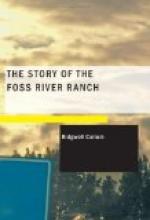In these last days of waning prosperity Bunning-Ford had noticeably changed. With loss of property he had lost much of that curious veneer of indolence, utter disregard of consequences, which had always been his. Not, that he had suddenly developed a violent activity or boisterous enthusiasm. Simply his interest in things and persons seemed to have received a fillip. There seemed to be an air of latent activity about him; a setness of purpose which must have been patent to any one sufficiently interested to observe the young rancher closely. But Foss River was too sleepy—indifferent—to worry itself about anybody, except those in its ranks who were riding the high horse of success. Those who fell out by the wayside were far too numerous to have more than a passing thought devoted to them. So this subtle change in the man was allowed to pass without comment by any except, perhaps, the money-lender, Lablache, and the shrewd, kindly wife of the doctor—people not much given to gossip.
It was only since the discovery of Lablache’s perfidy that “Lord” Bill had understood what living meant. His discovery in Smith’s saloon had roused in him a very human manhood. Since that time he had been seized with a mental activity, a craving for action he had never, in all his lazy life, before experienced. This sudden change had been aggravated by Lablache’s subsequent conduct, and the flame had been fanned by the right that Jacky had given him to protect her. The sensation was one of absorbing excitement, and the loss of property sat lightly upon him in consequence. Money he had not—property he had not. But he had now what he had never possessed before—he had an object.
A lasting, implacable vengeance was his, from the contemplation of which he drew a satisfaction which no possession of property could have given him. Nature had, with incorrigible perversity, cut him out for a life of ease, whilst endowing him with a character capable of very great things. Now, in her waywardness she had aroused that character and overthrown the hindering superficialty in which she had clothed it. And further to mark her freakish mood, these same capabilities which might easily, under other circumstances, have led him into the fore-front of life’s battle, she directed, with inexorable cruelty, into an adverse course. He had been cheated, robbed, and his soul thirsted for revenge. Lablache had robbed the uncle of the girl he loved, and, worse than all, the wretch had tried to oust him from the affections of the girl herself. Yes, he thirsted for revenge as might any traveler in a desert crave for water. His eyes, no longer sleepy, gleamed as he thought. His long, square jaws seemed welded into one as he thought of his wrongs. His was the vengeance which, if necessary, would last his lifetime. At least, whilst Lablache lived no quarter would he give or accept.
Something of this he was thinking as he took his farewell of the ranch on the hill, and struck out in the direction of the half-breed camp situated in a hollow some distance outside the settlement of Foss River.




